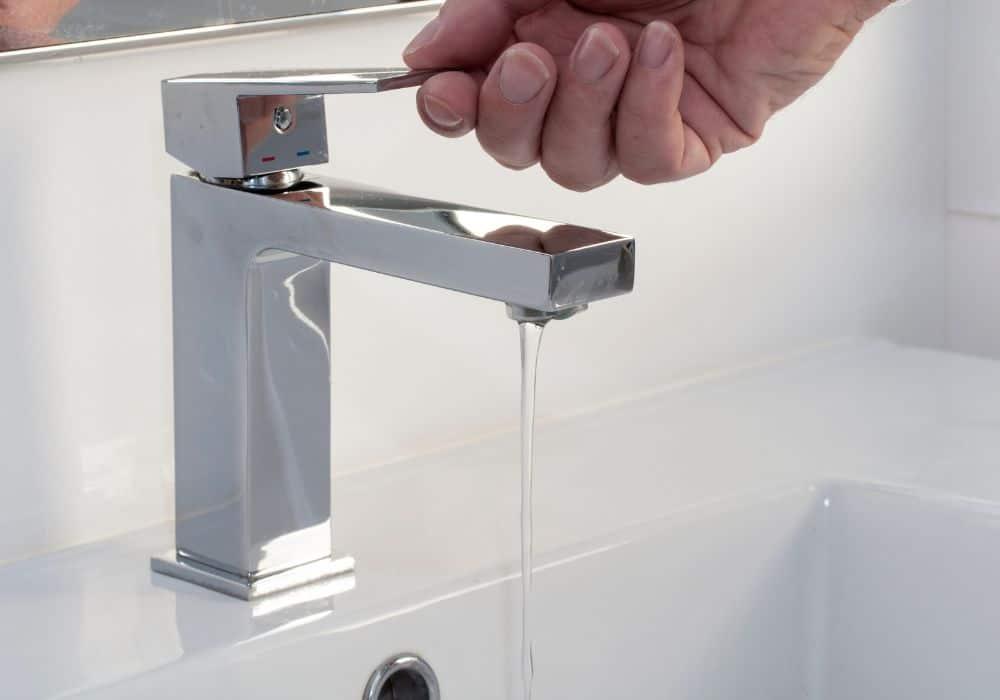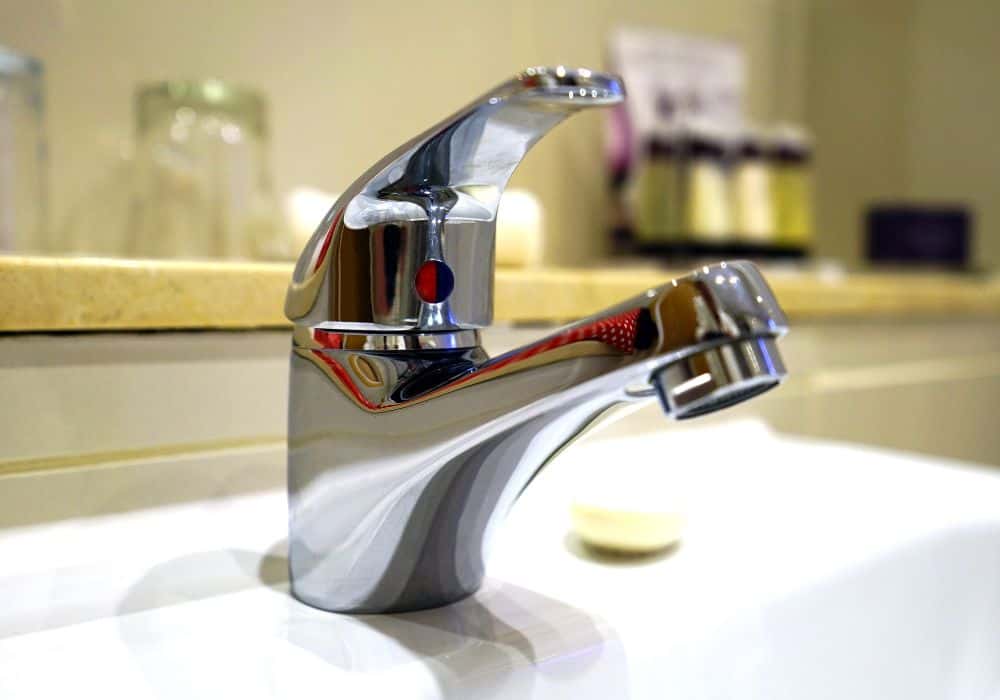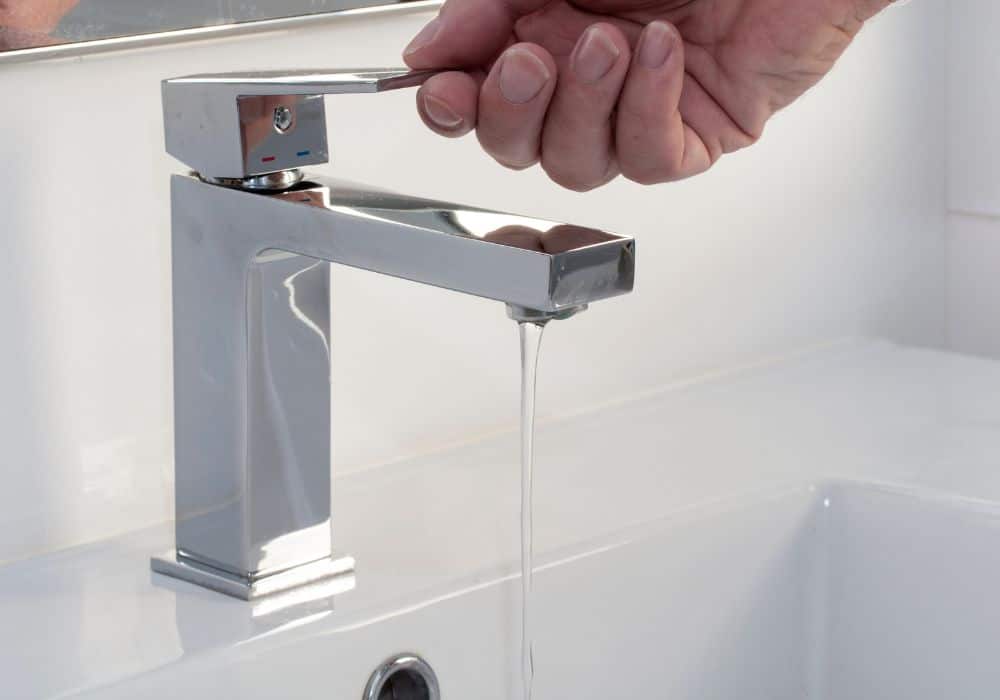No water dispensing from the hot side of your faucet? No problem; in this how-to guide, we show you how to diagnose and fix this problem in no time.
- What Knives Does Hell’s Kitchen Star Gordon Ramsay Use: Gordon Ramsay Knives (2023)
- How Long Does it Typically Take to Remodel a Kitchen?
- How Much Does Cabinet Refacing Cost? [2023 Data]
- Crime Scene Kitchen Season 2 Episode 10 Release Date and Time, Countdown, When Is It Coming Out?
- The Best Paint Sprayers For Cabinets: Our Top 6 Picks
Some major reasons water might not be dispensing from the hot side of the faucet include; airlock issues, a faulty water heating system, blocked plumbing, valve malfunctions, or pipe blockages.
You are watching: 6 Reasons Why No Water Dispensing from Hot Side of Faucet
For the remainder of this article, we discuss the causes of this issue and ways you can remedy the situation without going through the stress of engaging the services of an expert.
Why Water isn’t Dispensing from the Hot Side of Your Faucet
To help solve this problem, you must first understand its cause; hence, here we discuss six common causes of hot water not dispensing from faucets.
1. Airlock Issues

One culprit of problems relating to water not dispensing from the hot side of the faucet is traceable to trapped air, which can, in turn, lead to partial or total obstruction of the faucet.
This occurs because the hot water unit flows from a water heater and isn’t connected directly to the main water line, which means there is already a reduction in the pressure inside the hot water pipes.
So, while the cold water line has enough force to push any air trapped inside the water line, the hot water line’s pressure is not enough to achieve this, thus causing airlock issues. Due to this pressure difference, you may get cold water from the cold and hot water lines.
- Solution
To resolve this issue, follow these steps.
Step 1: Attach a hosepipe with one end at the mouth of the hot water tap and the other at the end of the cold water tap without leaving any space.
Step 2: Proceed to open the hot water first and then the cold water. The pressure released from the cold-water line should be enough to release any air trapped in the hot-water line.
Step 3: Leave it running for 30 seconds before you turn it off. Repeat this trick a few more times to get the maximum effect.
2. Cartridge Problems
Cartridge problems are popular with homes that use a single-action faucet. Although the single-action faucet helps regulate the amount of hot or cold water that flows, the dirt the cartridge collects will block the water pathway over time. This mainly affects the hot water line due to its reduced pressure.
- Solution
To fix this problem, removing the cartridge is necessary so you can clean it and observe the parts.
Step 1: Turn off the water supply line to the faucet
Read more : How to Install Peel and Stick Tile Backsplash & Product Review
Step 2: Using a screwdriver, take out the faucet handle
Step 3: Take out the cartridge from the faucet using a plier
Step 4: Place the cartridge in vinegar to allow the removal of debris (it is best to leave it for a day)
Step 5: Once the cartridge is clean, rinse it off and place it back in the faucet before you attach it and turn on your water supply. This will help eliminate any blockage in the cartridge and faucet. Make sure you tighten any loose nuts and screws to avoid future problems.
3. Problem with the Water Heater
Hot water faucet failure problems can also be traced to issues with the water heater. This is because water heaters are subject to degradation and rust because of the amount of water that runs through them, so it is only a matter of time before the heater fails.
There are three major reasons why your water heater may be faulty, and once you can identify these problems, you will know what step to take next. The issues are rust, a bad energy source, and a defective heating system.
- Rust
When dealing with water heating systems, rust is unavoidable. With time, water constantly running through the system depreciates the material of the water heater and causes leaks. A leak caused by rust is impossible to miss on any heater.
In the event of rust, the chances of you successfully repairing the damages done to the system are quite slim, which means you will have to replace the damaged heater with a new one.
- Faulty Heating System
You don’t have hot water in your kitchen sink simply because the hot water tank itself may be faulty. So how do you confirm this? First, turn off all electrical links to the heater and remove the heating elements in the system along with the thermostat.
Once you have done this, check the element for any damage signs, which would be why the heater failed in the first place. If the damages are irreparable, it is best if you get a new heater and have it installed in your home.
- Energy Source
What fuels your heater? Is it a gas-based or electric source? There is a chance the electricity source is compromised somehow, which has caused a breakage in the power supply to your water heater.
Many gas-powered heaters come with a temperature-operated automatic gas shut-off valve depending on how hot the temperature gets. This feature can kick in and shut down the heater by reducing the temperature of the water.
4. Frozen Pipe Issues

This is a major challenge for people living in icy areas. The implication is that water flow will be halted and cannot reach the taps. Although this issue is not long-term, it can be quite annoying as it comes and goes with the season.
- Solution
There are several DIY remedies to help you unfreeze frozen pipes. Some devices you can use to unfreeze frozen pipes include heat guns, heat pads, and hairdryers.
Read more : How to Paint Unfinished Cabinets
Although these items can help you unfreeze the pipes earlier than usual, the best remedy would be to prepare ahead by winterizing the pipes to prevent them from freezing in the first place.
5. Blocked Plumbing
When you put on your hot water tap, and nothing comes out, check to see if it is a general problem with all the tap dispensing in your home. Check the kitchen sink, shower faucets, and anywhere else that dispenses hot water.
If hot water comes out from the other taps but one, it means a particular hot water line is blocked. Mineral deposits, debris, and sediment are the most likely cause of a blocked faucet. The pressure of the hot water also adds to this problem.
This issue, accompanied by low water pressure, will hinder the full flow of water to the faucets.
- Solution
Here are remedies to water not dispensing from the hot side of the faucet that may result from blocked plumbing.
Increase the control valve to the highest point to ensure you are not limiting the already reduced pressure. There are two possible places to check to confirm that you have a blockage: the aerator and the faucet.
If pressure is not enough to restore flow, you will need to remove the screw at the end and check if it is the aerator that has compounded dirt. In this case, clearing the dirt and attaching it back to the faucet would be easy.
Another part that may be blocked is the faucet itself, in which case you need to turn off the water supply lines so you can remove the faucet and clear it. Vinegar, water, and a long brush will help you clear the faucet.
It helps if you let the vinegar sink into the faucet overnight. This will allow you to remove the dirt a lot easier.
6. When the Problem is Caused by Water Valves/Tap Washers

Every water source in your home has to go through the water valves before you can access it. A faulty valve will cause a seizure in water flow. Check the valve that runs through your water heater for the hot water faucet.
Another problem you may be having is with the tap washer. If the tap is bad, it will limit your access to flowing hot water. The best way to observe this is to follow if the tap has been dispensing water more freely than usual.
If it has, it means the tap is compromised, and the best solution, in this case, is to replace the tap with a new one.
- Solution
If this valve is locked, you have to open it back to restore flow, but if this hot water valve is damaged, you must purchase a new one and reattach it to the sink.
Final Thoughts
As you can see from the discussion above, water dispensing repairs do not mean you need to engage the services of a professional plumber. All you need to do is diagnose the problem and follow the steps explained to remedy the situation. You’d have your hot water dispensing back in no time.
Source: https://gardencourte.com
Categories: Kitchens


